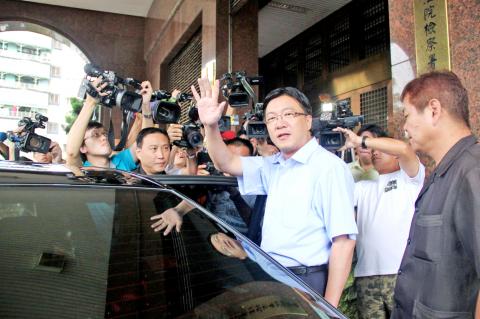Keelung City Council Speaker Huang Ching-tai (黃景泰) was released on bail yesterday after prosecutors asked on Wednesday that he be detained on suspicion of influence peddling in a number of construction projects.
The prosecution on Wednesday asked the Keelung District Court to grant its request that Huang be detained. The request was rejected yesterday and Huang was released on NT$1.2 million (US$40,000) bail, but banned from traveling overseas.
The city council speaker was interrogated on suspicion of his involvement in pressuring Keelung City Government officials on construction projects.

Photo: Wu Sheng-ju, Taipei Times
The prosecutors had found stashes of cash in New Taiwan dollar and Chinese Renminbi with an estimated total value of about NT$5 million in Huang’s office on Tuesday.
The investigation team had immediately called for Huang’s financial records, suspecting the wads of cash to have been bribes, but Huang claimed that the money is his election campaign fund.
Huang is the Chinese Nationalist Party’s (KMT) candidate for the year-end Keelung mayoral election.
KMT spokesperson Charles Chen (陳以信) said yesterday morning that since Huang is currently not in detention, which would have cost Huang his KMT party membership and with it his candidacy, “there is no question about using party discipline at this stage.”
However, the KMT might still lose its prospective Keelung mayoral aspirant, as the prosecutors lodged an appeal yesterday immediately after the court granted Huang bail.
The party said it would take measures to adjust to later developments in the case. If Huang is taken into custody, measures could include him being subjected to party discipline or his party membership being revoked, the party launching another primary or enlisting other possible candidates.
Former Presidential Office deputy secretary-general Lo Chih-chiang (羅智強) has been rumored to be one of the possible replacements.
Lo has caught the media’s attention by saying on Facebook, writing about the matter, that “there is no such thing as a definite candidate.” However, he declined to be specific on whether this “definite candidate” refers to Huang or himself.
While Charles Chen refused to comment on the expected impact or potential harm to the KMT’s election effort incurred by Huang’s case, KMT Legislator Liao Kuo-tung (廖國棟) was explicit in expressing his worries.
“The prospects are not looking good. So the party would definitely deal with it, rather than leaving decisions to [Huang’s] personal will and causing further damage to the party,” Liao said.

CHAOS: Iranians took to the streets playing celebratory music after reports of Khamenei’s death on Saturday, while mourners also gathered in Tehran yesterday Iranian Supreme Leader Ayatollah Ali Khamenei was killed in a major attack on Iran launched by Israel and the US, throwing the future of the Islamic republic into doubt and raising the risk of regional instability. Iranian state television and the state-run IRNA news agency announced the 86-year-old’s death early yesterday. US President Donald Trump said it gave Iranians their “greatest chance” to “take back” their country. The announcements came after a joint US and Israeli aerial bombardment that targeted Iranian military and governmental sites. Trump said the “heavy and pinpoint bombing” would continue through the week or as long

TRUST: The KMT said it respected the US’ timing and considerations, and hoped it would continue to honor its commitments to helping Taiwan bolster its defenses and deterrence US President Donald Trump is delaying a multibillion-dollar arms sale to Taiwan to ensure his visit to Beijing is successful, a New York Times report said. The weapons sales package has stalled in the US Department of State, the report said, citing US officials it did not identify. The White House has told agencies not to push forward ahead of Trump’s meeting with Chinese President Xi Jinping (習近平), it said. The two last month held a phone call to discuss trade and geopolitical flashpoints ahead of the summit. Xi raised the Taiwan issue and urged the US to handle arms sales to

State-run CPC Corp, Taiwan (CPC, 台灣中油) yesterday said that it had confirmed on Saturday night with its liquefied natural gas (LNG) and crude oil suppliers that shipments are proceeding as scheduled and that domestic supplies remain unaffected. The CPC yesterday announced the gasoline and diesel prices will rise by NT$0.2 and NT$0.4 per liter, respectively, starting Monday, citing Middle East tensions and blizzards in the eastern United States. CPC also iterated it has been reducing the proportion of crude oil imports from the Middle East and diversifying its supply sources in the past few years in response to geopolitical risks, expanding

OTHER OPTIONS: Given possible US intervention and Taiwanese counterattacks, China might opt to blockade Taiwan or take its outlying islands instead of an all-out invasion A US think tank has urged Taiwan to adopt a “hellscape” strategy that would flood the Taiwan Strait with drones and other uncrewed systems to deter invasion by China. In its report, Hellscape for Taiwan, published on Thursday, the Center for a New American Security said Taipei’s asymmetric defense approach — often described as a “porcupine strategy” — needs to evolve to keep pace with the growing capabilities of the Chinese People’s Liberation Army. The “hellscape” strategy involves saturating the air and waters around Taiwan with thousands of drones and other platforms capable of striking invading forces from multiple domains at once. Long-range